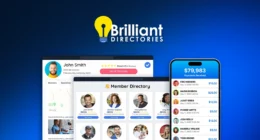Free help desk software allows small businesses to manage customer support efficiently without costly investments. Popular options like Zoho Desk, Freshdesk, and Hiver offer essential features including ticket management, automation tools, and multichannel support capabilities. These platforms streamline customer communications through email, social media, and chat while providing knowledge base solutions and reporting tools. Small business owners can improve response times and track performance metrics through centralized dashboards. Understanding key features and limitations helps determine the best solution for specific business needs.
Quick Overview
- Zoho Desk offers a free plan with email ticketing, social media integration, and self-service portals ideal for small businesses.
- Freshdesk provides free omnichannel support with email ticketing, knowledge base features, and basic reporting capabilities.
- Free help desk software centralizes customer communications and automates routine tasks, helping small teams manage higher inquiry volumes.
- Small businesses can improve customer service with free platforms offering ticket tracking, automation, and knowledge base functionality.
- Essential features like intuitive interfaces and omnichannel capabilities are available in free help desk solutions for small businesses.
Why Small Businesses Need Help Desk Software

Small business operations face mounting customer service challenges in today’s fast-paced digital marketplace. Help desk software offers essential solutions that streamline customer support and boost operational efficiency. By centralizing communications across multiple channels like email, phone, and chat, businesses can track and resolve issues more effectively.
The software’s automation features handle routine tasks, allowing small teams to manage higher inquiry volumes without increasing staff. Tickets are automatically assigned and prioritized, ensuring no customer request falls through the cracks. Additionally, detailed customer histories enable agents to provide personalized support, building stronger relationships and increasing retention rates. Many platforms include AI-powered chatbots that provide 24/7 customer support and help reduce the workload on human agents.
For growing businesses, help desk platforms offer scalable solutions that adapt to increasing demands while providing valuable data insights for informed decision-making and continuous improvement of customer service processes.
Top Free Help Desk Solutions in the Market
Several excellent free help desk solutions exist in today’s market, offering small businesses robust features without straining their budgets. These platforms provide essential tools for managing customer support efficiently while maintaining professional service standards. A key advantage is the ability to streamline customer service by managing all support requests through one central interface.
Popular free help desk options include:
- Zoho Desk and Freshdesk excel in multichannel support, offering email ticketing, social media integration, and customizable help centers.
- HubSpot Service Hub stands out with its CRM integration and thorough feedback collection system.
- LiveAgent provides unlimited ticket history and built-in team collaboration tools.
- Jira Service Management caters specifically to IT teams with incident management capabilities.
Each solution offers unique advantages, from Zoho’s workflow automation to Freshdesk’s intuitive interface. Small businesses can choose the platform that best aligns with their specific support needs and team structure.
Essential Features to Look for in Free Help Desk Tools

Understanding what features to prioritize in a help desk solution empowers businesses to make informed decisions about their customer support infrastructure.
When evaluating free help desk tools, small businesses should focus on five core functionalities:
- An intuitive interface that simplifies ticket management and reduces training time
- Omnichannel capabilities that integrate email, social media, and chat communications into one unified inbox
- Basic automation features for ticket routing and SLA tracking
- A knowledge base platform that enables customer self-service options
- Essential reporting tools that track key metrics like response times and resolution rates
These fundamental features guarantee efficient customer support operations while maximizing the value of free help desk solutions. Small businesses should particularly emphasize ease of use and automation capabilities, as these elements directly impact team productivity and customer satisfaction. Solutions like Freshdesk and Spiceworks offer robust free plans that make enterprise-level features accessible to small businesses without straining their budgets.
Benefits of Implementing Free Help Desk Software
Five compelling benefits await businesses that implement free help desk software, making it an invaluable addition to their customer service infrastructure.
The advantages extend across multiple operational areas, delivering tangible improvements in both customer satisfaction and internal efficiency. Small businesses report increased brand loyalty through personalized customer interactions enabled by help desk solutions. Specifically, these benefits include:
- Enhanced customer experience through faster query resolution, personalized interactions, and convenient self-service options
- Significant cost savings by eliminating software expenses and reducing operational overhead through automated workflows
- Improved team productivity with streamlined ticket management and reduced manual tasks, allowing staff to focus on complex issues
- Better operational efficiency through centralized communication channels and cross-departmental collaboration
These benefits make free help desk software particularly attractive for small businesses looking to enhance their customer service capabilities while maintaining budget constraints. The data-driven insights provided also enable continuous service improvement and informed decision-making.
How to Choose the Right Free Help Desk Platform

While free help desk software offers significant advantages, selecting the right platform requires careful consideration of multiple factors. Small businesses should start by evaluating their specific requirements, including customer service volume, number of support agents, and preferred communication channels. A well-chosen ticketing system can significantly improve response times and satisfaction through effective prioritization of customer issues.
Choosing free help desk software demands thorough evaluation of business needs, from service volume to communication preferences.
The selection process should focus on five key areas:
- Evaluating essential features like multichannel support and automation capabilities
- Understanding free plan limitations, especially user caps and monthly ticket allowances
- Verifying integration possibilities with existing business tools
- Testing the platform through free trials or demos
- Reviewing user feedback and vendor documentation
Before making a final decision, businesses must confirm the chosen platform aligns with their growth plans and can scale through paid upgrades when needed. This systematic approach helps avoid selecting software that may become limiting as the business expands.
Common Limitations and Workarounds of Free Help Desk Systems
Free help desk software comes with notable constraints that small businesses must navigate strategically. Understanding these limitations helps organizations develop effective workarounds while operating within free-tier restrictions.
Common limitations and their practical solutions include:
- Limited Features: Combat basic functionality by implementing manual processes and templates to handle advanced needs like ticket prioritization
- Security Concerns: Enhance protection by adding third-party security tools and establishing strict internal protocols for data handling
- Scalability Issues: Manage growth constraints by rotating ticket archives and implementing efficient workflow processes
- Support Challenges: Build an internal knowledge base and designate tech-savvy team members as system administrators
Small businesses can maximize free help desk tools by combining these workarounds with careful planning and systematic implementation of alternative solutions when needed. Implementing a self-service portal can significantly reduce the strain on support teams while empowering customers to find solutions independently.
Frequently Asked Questions
Can Free Help Desk Software Integrate With My Existing CRM System?
Many free help desk solutions offer integration capabilities with popular CRM systems, though features may be limited compared to paid versions. Common integrations include email ticketing, customer interaction logs, and shared databases with platforms like HubSpot and Salesforce.
While native integration options are available, some technical setup may be required. It’s important to verify compatibility with specific CRM platforms and understand potential limitations in automation and data syncing capabilities.
How Secure Is Customer Data Stored in Free Help Desk Platforms?
Like a bank vault with varying levels of security, free help desk platforms offer a range of data protection measures. Most platforms provide industry-standard SSL encryption and GDPR compliance, ensuring basic data security. However, free versions may lack advanced features like real-time monitoring and extensive audit logs.
Data is typically protected through encrypted servers and secure communication channels, though businesses should implement additional security practices like strong password policies and regular staff training to enhance protection.
What Happens to Our Data if We Switch Between Different Help Desk Providers?
When switching between help desk providers, data migration requires careful planning and execution. Organizations must map data fields between systems, safeguard compatibility, and maintain security during transfer.
Key considerations include:
- Creating complete data backups before migration
- Using secure transfer protocols to protect sensitive information
- Testing data accuracy after transfer
- Documenting field mappings and customizations
Some data loss risks exist, making thorough preparation and verification essential for successful shifts.
Are There Any Hidden Costs Associated With Free Help Desk Software?
Like a free lunch that comes with unexpected strings attached, free help desk software often carries hidden costs.
These typically include:
- Lost productivity from manual processes due to missing automation
- Extra staff time needed to work around limited features
- Potential IT expenses for security configuration
- Costs of third-party tools to fill functionality gaps
- Training resources for workarounds
- Possible data migration fees when upgrading
- Unplanned expenses for essential add-ons like advanced reporting.
Can Multiple Team Members Access the Help Desk System Simultaneously?
Yes, most free help desk systems allow multiple team members to work simultaneously. Team members can access shared inboxes, view tickets, and collaborate in real-time through centralized dashboards. Role-based permissions guarantee secure access control, while automation features help distribute workload evenly among agents.
Tools like Spiceworks and LiveAgent offer unlimited agent access at no cost, though some free versions may have limitations on advanced features or concurrent chat channels.
Conclusion
Implementing free help desk software can transform how small businesses handle customer support, just as it did for countless startups that grew into industry leaders. While free versions have limitations, they offer essential features that streamline ticket management, enhance customer communication, and boost team efficiency. By carefully evaluating options and matching them to specific business needs, companies can leverage these tools to deliver professional support without straining their budget.








